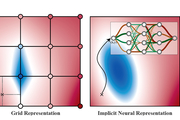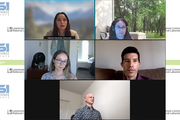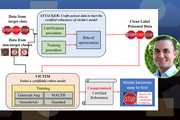Did you know we have a monthly newsletter? View past volumes and subscribe.
Project co-led at LLNL looks to improve visualization of largescale datasets
Oct. 27, 2022 -
LLNL researchers are starting work on a three-year project aimed at improving methods for visual analysis of large heterogeneous data sets as part of a recent Department of Energy funding opportunity. The joint project, entitled “Neural Field Processing for Visual Analysis,” will be led at LLNL by co-principal investigator (PI) Andrew Gillette. Gillette is joined by lead PI Matthew Berger at...
ESGF launches effort to upgrade climate projection data system
Oct. 5, 2022 -
The Earth System Grid Federation (ESGF), a multi-agency initiative that gathers and distributes data for top-tier projections of the Earth’s climate, is preparing a series of upgrades that will make using the data easier and faster while improving how the information is curated. The federation, led by the Department of Energy’s Oak Ridge National Laboratory in collaboration with Argonne and...
LLNL to cooperate with University of Utah's one oneAPI Center of Excellence
Sept. 21, 2022 -
The University of Utah has announced the creation of a new oneAPI Center of Excellence focused on developing portable, scalable and performant data compression techniques. The oneAPI Center will be headed out of the University of Utah’s Center for Extreme Data Management Analysis and Visualization (CEDMAV) and will involve the cooperation of LLNL’s Center for Applied Scientific Computing. It...
An open-source, data-science toolkit for energy: GridDS
Aug. 2, 2022 -
As the number of smart meters and the demand for energy is expected to increase by 50% by 2050, so will the amount of data those smart meters produce. While energy standards have enabled large-scale data collection and storage, maximizing this data to mitigate costs and consumer demand has been an ongoing focus of energy research. An LLNL team has developed GridDS—an open-source, data-science...
Defending U.S. critical infrastructure from nation-state cyberattacks
July 21, 2022 -
For many years, LLNL has been conducting research on cybersecurity, as well as defending its systems and networks from cyberattacks. The Lab has developed an array of capabilities to detect and defend against cyberintruders targeting IT networks and worked with government agencies and private-sector partners to share its cybersecurity knowledge to the wider cyberdefense community. LLNL has...
Assured and robust…or bust
June 30, 2022 -
The consequences of a machine learning (ML) error that presents irrelevant advertisements to a group of social media users may seem relatively minor. However, this opacity, combined with the fact that ML systems are nascent and imperfect, makes trusting their accuracy difficult in mission-critical situations, such as recognizing life-or-death risks to military personnel or advancing materials...
CASC team wins best paper at visualization symposium
May 25, 2022 -
A research team from LLNL’s Center for Applied Scientific Computing won Best Paper at the 15th IEEE Pacific Visualization Symposium (PacificVis), which was held virtually on April 11–14. Computer scientists Harsh Bhatia, Peer-Timo Bremer, and Peter Lindstrom collaborated with University of Utah colleagues Duong Hoang, Nate Morrical, and Valerio Pascucci on “AMM: Adaptive Multilinear Meshes.”...
Unprecedented multiscale model of protein behavior linked to cancer-causing mutations
Jan. 10, 2022 -
LLNL researchers and a multi-institutional team have developed a highly detailed, machine learning–backed multiscale model revealing the importance of lipids to the signaling dynamics of RAS, a family of proteins whose mutations are linked to numerous cancers. Published by the Proceedings of the National Academy of Sciences, the paper details the methodology behind the Multiscale Machine...
LLNL establishes AI Innovation Incubator to advance artificial intelligence for applied science
Dec. 20, 2021 -
LLNL has established the AI Innovation Incubator (AI3), a collaborative hub aimed at uniting experts in artificial intelligence (AI) from LLNL, industry and academia to advance AI for large-scale scientific and commercial applications. LLNL has entered into a new memoranda of understanding with Google, IBM and NVIDIA, with plans to use the incubator to facilitate discussions and form future...
Building confidence in materials modeling using statistics
Oct. 31, 2021 -
LLNL statisticians, computational modelers, and materials scientists have been developing a statistical framework for researchers to better assess the relationship between model uncertainties and experimental data. The Livermore-developed statistical framework is intended to assess sources of uncertainty in strength model input, recommend new experiments to reduce those sources of uncertainty...
Summer scholar develops data-driven approaches to key NIF diagnostics
Oct. 20, 2021 -
Su-Ann Chong's summer project, “A Data-Driven Approach Towards NIF Neutron Time-of-Flight Diagnostics Using Machine Learning and Bayesian Inference,” is aimed at presenting a different take on nToF diagnostics. Neutron time-of-flight diagnostics are an essential tool to diagnose the implosion dynamics of inertial confinement fusion experiments at NIF, the world’s largest and most energetic...
Inaugural industry forum inspires ML community
Sept. 16, 2021 -
LLNL held its first-ever Machine Learning for Industry Forum (ML4I) on August 10–12. Co-hosted by the Lab’s High-Performance Computing Innovation Center (HPCIC) and Data Science Institute (DSI), the virtual event brought together more than 500 enrollees from the Department of Energy (DOE) complex, commercial companies, professional societies, and academia. Industry sponsors included...
Visualization software stands the test of time
Sept. 13, 2021 -
In the decades since LLNL’s founding, the technology used in pursuit of the Laboratory’s national security mission has changed over time. For example, studying scientific phenomena and predicting their behaviors require increasingly robust, high-resolution simulations. These crucial tasks compound the demands on high-performance computing hardware and software, which must continually be...
Former interns share insights during career panel
Aug. 19, 2021 -
The DSI’s new career panel series continued on August 10 with a session featuring former LLNL interns who converted to full-time employment at the Lab. Inspired by the annual Women in Data Science conference, the panel session was open to all LLNL staff and students. Moderator Mary Silva was joined by panelists from the Computing and Engineering Directorates: Brian Bartoldson, Jose Cadena...
Laser-driven ion acceleration with deep learning
May 25, 2021 -
While advances in machine learning over the past decade have made significant impacts in applications such as image classification, natural language processing and pattern recognition, scientific endeavors have only just begun to leverage this technology. This is most notable in processing large quantities of data from experiments. Research conducted at LLNL is the first to apply neural...
The data-driven future of extreme physics
May 19, 2021 -
By applying modern machine learning and data science methods to “extreme” plasma physics, researchers can gain insight into our universe and find clues about creating a limitless amount of energy. In a recent perspective published in Nature, LLNL scientists and international collaborators outline key challenges and future directions in using machine learning and other data-driven techniques...
Conference papers highlight importance of data security to machine learning
May 12, 2021 -
The 2021 Conference on Computer Vision and Pattern Recognition, the premier conference of its kind, will feature two papers co-authored by an LLNL researcher targeted at improving the understanding of robust machine learning models. Both papers include contributions from LLNL computer scientist Bhavya Kailkhura and examine the importance of data in building models, part of a Lab effort to...
Winter hackathon highlights data science talks and tutorial
March 24, 2021 -
The Data Science Institute (DSI) sponsored LLNL’s 27th hackathon on February 11–12. Held four times a year, these seasonal events bring the computing community together for a 24-hour period where anything goes: Participants can focus on special projects, learn new programming languages, develop skills, dig into challenging tasks, and more. The winter hackathon was the DSI’s second such...
Ana Kupresanin featured in FOE alumni spotlight
March 10, 2021 -
LLNL's Ana Kupresanin, deputy director of the Center for Applied Scientific Computing and member of the Data Science Institute council, was recently featured in a Frontiers of Engineering (FOE) alumni spotlight. Kupresanin develops statistical and machine learning models that incorporate real-world variability and probabilistic behavior to quantify uncertainties in engineering and physics...
Lab researchers explore ‘learn-by-calibration’ approach to deep learning to accurately emulate scientific process
Feb. 10, 2021 -
An LLNL team has developed a “Learn-by-Calibrating” method for creating powerful scientific emulators that could be used as proxies for far more computationally intensive simulators. Researchers found the approach results in high-quality predictive models that are closer to real-world data and better calibrated than previous state-of-the-art methods. The LbC approach is based on interval...






















